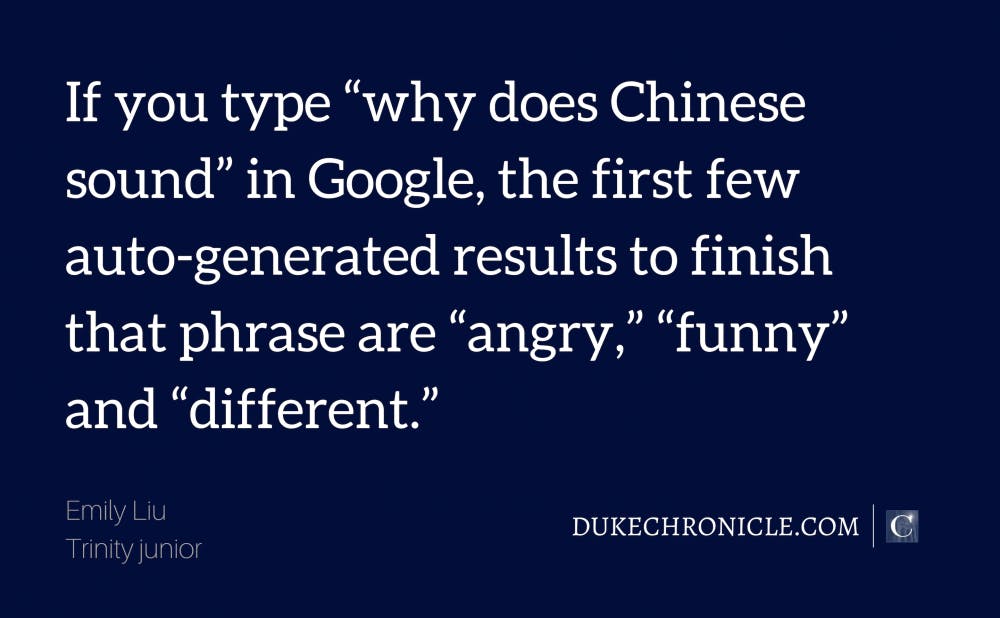When Juliet proclaims her love for Romeo, she says, “What’s in a name? That which we call a rose / By any other name would smell as sweet.”
In Chinese, my last name Liu (刘) is pronounced líu, similar to how you’d pronounce the English word “lieu.” Yet, in the first 18 years of my existence, I had always pronounced it like the Romanized “loo”—it just wasn’t worth the effort to correct people. During the first semester of my freshman year, my friend Zoe pronounced my last name the way it should be pronounced, and I was shook. Why was I so surprised that someone actually got my name right?
Juliet wasn’t so right. A rose by any other name can become something else entirely, constructed and molded by the connotations that each word inherently carries. The Romanization and Anglicization of foreign words in particular, and especially words as close to your heart as your family name, have important societal implications that are too often swept under the rug.
When I order the Shanghai bowl from Ginger & Soy, I always find myself pronouncing it differently than the time before—sometimes it’s the standard “Shanghai,” and other times, it’s “shàng hăi” with the correct tonal inflections. You’d think a bowl of orange chicken wouldn’t make me think so hard. While I want to remain as true to the Chinese language as possible (out of some obscure sense of duty to my family’s heritage), part of me thinks I should just stick with the Anglicized “Shanghai”—it’s orange chicken, after all.
But surely my family name deserves more thought than a bowl of orange chicken.
I spent winter break in China, and I noticed that in the audio recordings on the metro, the English version says the names of destinations with correct Chinese pronunciation. One can hope that English-speaking visitors are able to match up the proper pronunciation with the name of the stop that they’re looking for. The pinyin of Chinese that is displayed on metro maps is pretty intuitive, but for those that don’t find it so easy, this correct pronunciation could prove to be a real hurdle.
But what if the main purpose of language is simply to communicate, not to influence? In that case, perhaps the optimal strategy in pronunciation is to accommodate the listener and to pronounce words the way that people expect them to be heard, rather than the “correct” pronunciation. Think about all the people who adopt aliases when they place an order at Starbucks—suddenly Sachit becomes Sal, and Jiachen becomes JC. Maybe this act is a win-win situation, making the situation easier for both the barista and for themselves.
This whole ordeal has become a common joke among people who share names that are often butchered by those unfamiliar with the language. In a trailer for “The Patriot Act with Hasan Minhaj,” Tan France, whose own name is simplified from Tanweer, says to Hasan, “I hear people pronouncing it Has-an Min-aj. I’m almost positive that’s not how we say it.” Hasan replies, “Well, it’s a brown thing. There is no Has-an Min-aj. That’s my Clark Kent.” But in this nonfictional world, why do we have to keep Clark Kent and Superman separate?
Perhaps this was always a subconscious exercise in self-preservation. Researchers have found that people with easier-to-pronounce names tend to be evaluated more positively than people with harder-to-pronounce names. When a name rolls off the tongue easily, we tend to associate a positive sentiment with it. And it’s easier for me to just tell someone to pronounce my last name the same way that they would naturally read it off a page.
There are certain phonemes that don’t exist in English, but do exist in other languages. To people who only speak English, these languages will sound not just harsh and grating, but also unnatural. If you type “why does Chinese sound” in Google, the first few auto-generated results to finish that phrase are “angry,” “funny” and “different.” People associate a negative sentiment with these foreign words, which is ultimately grounded in a discomfort with the unknown. In this sense, language is a vehicle through which Asian culture (and more) have been other-ized.
The way that other people have pronounced my name back to me, along with the greater surrounding dialogue surrounding Chinese culture, has undoubtedly shaped my own perception of the Chinese language and as a result, my perception of myself. I can see this in the way that I inadvertently cringe when I hear the sharpness of some Chinese words or in the way that I wrongly associate aggressiveness with certain dialects. But then I consciously stop myself and I think about the street markets in China, lined with hawkers shouting in Chinese, or the Chinese poems I memorized as a kid, and I remember the beauty of a language that has so often been demonized.
In reality, I don’t care about how you pronounce my name. And some people always get their names mispronounced. I’m more concerned with the implications of what it means for others to be so unfamiliar with a culture, and perhaps more importantly, to refuse to learn about the culture of another person and by extension, this person’s identity.
If language is the medium through which we may define and perceive identity, maybe Emily 刘 isn’t the same person as Emily Liu. In which case, I have to ask myself—which one am I?
Emily Liu is a Trinity junior. Her column runs on alternate Fridays.
Get The Chronicle straight to your inbox
Signup for our weekly newsletter. Cancel at any time.

